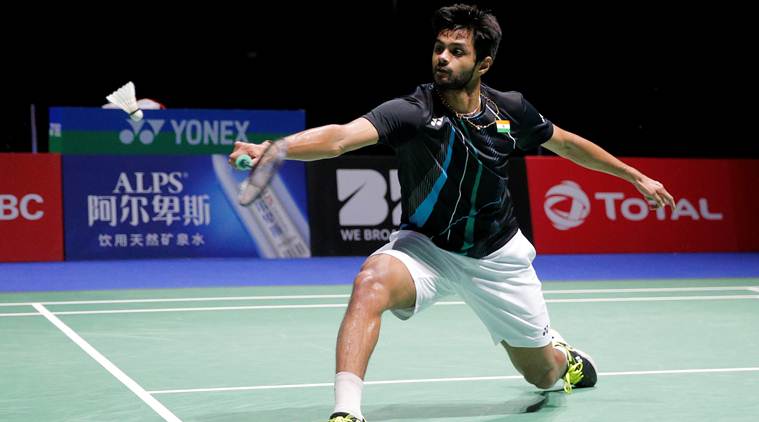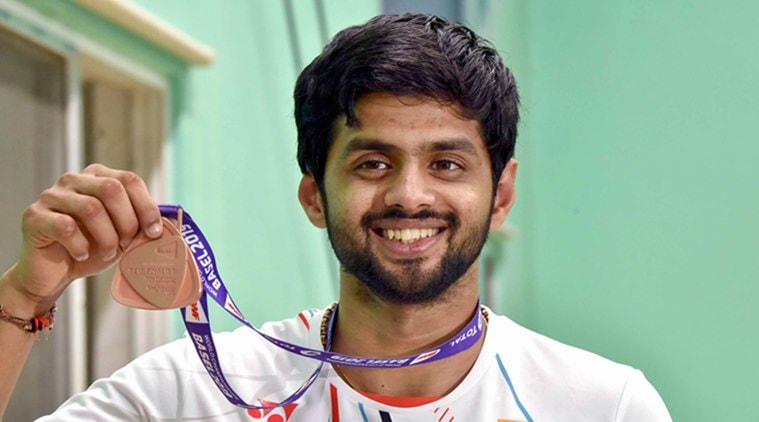 On Friday, along with women stars PV Sindhu and Sikki Reddy, Sai Praneeth resumed training on court at the SAI Gopichand Academy. (Reuters/FILE)
On Friday, along with women stars PV Sindhu and Sikki Reddy, Sai Praneeth resumed training on court at the SAI Gopichand Academy. (Reuters/FILE)
Looking back at the last four months of a life shorn of badminton, B Sai Praneeth says he’s lucky he got married last December, just before the pandemic struck. “The lockdown did not get boring and frustrating, only because she was around and I wasn’t all by myself,” he says of having the company of wife Swetha Jayanthi to negotiate a strangely still time in life, a world apart from the one-track fretting over badminton.
Unlike his peers he doesn’t remember any specific activity or hobby winding its way into his life or him suddenly developing a different dazzling dimension. No paintings or music for this shuttler whose pretty doodling strokes carry a sweet lilt of their own, when he’s on song.
Sure he chipped in at home with a spot of cleaning, some cooking and played some games on the phone. But the shuttler said he was focussed on spending time with his partner. Without being weighed down by worries of the future or the past that are never far from an athlete’s mind.
Uncertainty strangely brought a sense of calm because there simply was nothing else to be done.
Sai realises it’s a charmed state of mind. With a pandemic raging outside and the Olympics in the balance through the start of the summer, Sai says the itch to play again had crept up his skin in May after initially making peace with constraints of a home-bound lockdown.
Finally back to the training centre after a very loooong time ✌️😁 #goodfeeling #saigopichandacdemy pic.twitter.com/LXI8X2ixyH
— Sai Praneeth (@saiprneeth92) August 7, 2020
On Friday, along with women stars PV Sindhu and Sikki Reddy, Sai Praneeth resumed training on court at the SAI Gopichand Academy. Gingerly, and meticulously following the protocols: hand and court sanitising, temperature checks, oximeter readings, he had the 12-courts space to himself amongst the men’s singles shuttlers. And in different time slots with a couple of feeding sparrers, their own canisters of shuttles, water bottles and towels.
Plus the very focussed attention of coaches P Gopichand and Indonesian Agus Dwi Santoso – a rarity given those clamouring for their attention usually reads a long list: Srikanth, Prannoy, Sameer Verma, Kashyap, Gurusaidatt, Siril Verma and so on.
He may have won the first World Championships medal for Indian men in 36 years and looked the best bet to head to Tokyo — but the intense competition has always meant he’s hardly ever had the coaches focus exclusively on him.
With Srikanth and Saina Nehwal not in yet, and the doubles still a fortnight away at least from regrouping with Sindhu marking out her 6.30 am bubble slot, Sai Praneeth will clock in at 8.30 for his training set.
“We are going to be very careful and start slowly over the next two weeks. There are no tournaments till October, so there’s no hurry to be ready for something immediately,” he said, aware that resumption demanded extreme caution. “It had been tough without the game, but today it felt good to start playing, full of energy. Usually, when we return after breaks it’s from injury. This time that wasn’t a worry. It was just practice and it felt nice to hit the shuttle after a long time,” he said. “Usually the body is always in need of a break with all the travel and competition. This felt good – starting fresh and fit.”
🔙 ON COURT 🏃♂️ 🏃♀️ 🏸
JOSH 💯
2019 #WorldChampionship medallists are back on the court as they resume trainning finally after the lockdown.
Check out the first images 📸 of the training. ⏬#BadmintonIsBack #Badminton #sport #IndiaontheRise pic.twitter.com/Xu9Mpr4w6p
— BAI Media (@BAI_Media) August 7, 2020
Or as fit as one could be after being restricted to homes and with no real intensity in conditioning sessions. “See, you tell yourself that you are doing something at least — we tried to stay disciplined about online sessions with bands and medicine balls at home. But it’s frankly only 10-20 percent of our usual strength training. So coaches warned us to go very slow with all precautions,” he says candidly of a lockdown regimen that fizzled out when restricted to walls with furniture and family buzzing around.
He isn’t entirely cut off from realities outside the bubble either. “It’s not easy to get tested frequently. Even the public is not getting enough test kits. As athletes, we might not show symptoms, but we will be monitored closely and be careful knowing the situation is tough. If a test is needed at some point, we’ll do it,” he says.
For someone known for his touch-play, his trick shots and a snappy, entertaining pace when he’s fit, finding the sweet spot of strokes isn’t a major concern. “You’ll need to ask me in two weeks and I’ll tell you if I’ve forgotten some stroke,” he quips. But for someone who always looks more formidable than he is in the opening set and a shadow in the third, the worry is how the body will start loading up again.
“Touch is no big issue. The outside aspects like strength and fitness and speed in movements will be the things to keep an eye on,” says the talented shuttler.
“See even when I was injured, I would still come to the academy and work on something. So if I’d hurt my shoulder, I’d go run. If the leg was troubled, I’d do some upper body work. This is the first time that a break has meant badminton locked up with the key in the upper shelf out of sight even.
Sai Praneeth was scheduled to be at Tokyo Olympics – his Top 16 ranking safely ensuring his berth. But with the Olympics postponed, his sighting focus got realigned in April-May. “One year is a very long time without tournaments to carry on the same confidence I had at the start of this year,” he says.
It’s here that he calls for curbs on unbridled enthusiasm. “Hold on. We can’t directly be thinking about the Olympics next year. We can’t jump to that one tournament and forget everything in between. Selection tournaments (qualification meets) are still on. If I play well in those, my confidence will improve, I’ll get a better ranking and seeding. But also, there’s too much uncertainty on when and if tournaments will happen. So the Olympics is still very very far off,” he warns.
Success in the Rearview
What he does talk of with certainty is one year back: the bronze medal he won at the World Championships at Basel. It was a third place finish comprehensively overshadowed by PV Sindhu’s gold and India’s first world title. But given the surfeit of talented men’s singles players in India including former World No 1 Srikanth, Sai’s bronze indicated taking that talent to culmination while others routinely faltered.
As such, Sai Praneeth started the title shower in 2017 winning the Singapore Super Series. “I always do well if I’ve prepared well in training,” he says, adding he had looked at the Basel World’s draw and thought “Not Bad.”
“I obviously wasn’t thinking I’m definitely winning a medal. But I sensed I had a good chance. I had a good record against Hinting and Christie, the two Indonesians. I took it round by round and of course, the quarterfinals were the biggest match of my life. It was eventually a very satisfying performance beating two of the Top 8,” he says.
 The bronze medal Sai won at the World Championships at Basel. (FILE)
The bronze medal Sai won at the World Championships at Basel. (FILE)
He was under no pressure but he knew he had made the finals at the Swiss Open in March earlier in the year, so he wouldn’t struggle to find his bearings – the court conditions, shuttle speed, the general feel around the court.
“When I win at some place, there’s a gut feeling that I’ll do well again there. It happened in Singapore, and then again at Basel. There was a positive vibe plus I’d just been conferred with the Arjuna. I felt very confident,” he says.
It showed against the Indonesian Energizer bunny, Anthony Ginting who narrowly pipped 23-21 in the opener. “These tend to be 50-50 matches always. Confidence matters in such scenarios when I can put World No 3 under pressure.
In the medal match against Asiad champ Jonatan Christie, Sai Praneeth once again turned the knife in in the second part of the first game — an area he identified to mangle Christie’s mind. “I knew he would come under a lot of pressure as Indonesian medal hope. So I chose my moment to put pressure,” he recalls. He would crank up the pace and win the decisive passage after which the pressure of being a set down, spawned enough mental demons and fear of losing in the Indonesian’s head.
Ironically, Sai Praneeth himself has been guilty of not being ruthless enough to finish the match, often losing limply on the third. But not this time.
“I got used to soaking that pressure after losing so many games. But I am good at exerting pressure on opponents,” he says. In essence, he mocks their ranking credentials, baits them to make mistakes and preys on the burden they carry in having to deliver in the big events — a little like what opponents do to Srikanth. Strangulate with tight knots of expectations.
“I know it’s a big match for them too. So they are under pressure against me. It’s not just any Super Series, but a World’s medal round,” he explains.
It will take a bit of foolish solemn punting and sticking the neck out seriously to say that Sai Praneeth perhaps has the best temperament amongst men’s singles shuttlers — even better than the more successful and decorated and highly rated Kidambi Srikanth.
He’s not put his mind to seriously figuring out the algorithm of his success, but he lets slip this: “If there’s a chance of winning a big medal and I’m playing well, I’m good enough to pounce on the opportunity and grab the medal,” he says. It’ll be inaccurate to say Sai Praneeth’s world’s bronze was courtesy a favourable draw or plain luck.
Opponents tend to miss his ambition and ability to nail a win, well masked by a goofy, laidback, almost disinterested face and a shabby body language — loose-limbed, head bowed. It’s also his playing history.
Considered India’s most promising junior (remember Srikanth barely won in juniors), Sai Praneeth was immensely talented in his stroke making, and a perennial under-achiever given how little he delivered earlier.
“I used to get wins against big names in early rounds and lose immediately after,” he remembers. They would seem big wins at that point, but I knew it wasn’t enough. It was inconsistency,” he says. “But this was different. It was a medal match,” he says, a prince reclaiming his crown.
It’s also why the racquet bamboozler who loves playing some outrageous strokes, will head into Tokyo with the most disarming of weapons: his ability to convince the opponent he’s no threat at all. While he goes about scything reputations.
If there was an Indian athlete equipped to handle the vicissitudes of an unprecedented pandemic and come out of it with clear cut plans, it would be Sai Praneeth. On Friday, when the camp resumed, he kept repeating: let’s presume nothing about how the situation will pan out. But should the big medal dangle on the horizon within grasping distance, be assured, Sai Praneeth has the deceptively sharp blade in his arsenal to pounce on the chance.